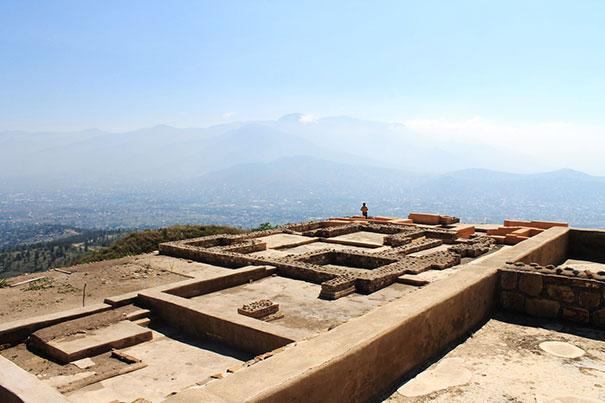
Professor Noreen Tuross is designing a course that will let students explore food and culture through the lens of archaeology at the recently excavated site at Atzompa in Oaxaca, Mexico.
Photo courtesy of Linda Reynard
The groundwork for learning abroad
President’s fund supports faculty efforts to offer international studies in summer
When William Anderson and Kevin Eggan looked at the prospects for students in developmental biology who wanted to study overseas, they didn’t find much. Their solution was to design a course that provided a rich laboratory experience while also giving students a chance to experience a foreign land.
Anderson, associate director of education and senior lecturer in Harvard’s Department of Stem Cell and Regenerative Biology, and Eggan, professor of stem cell and regenerative biology, are piloting a 10-week course this summer that pairs students with laboratories at the Karolinska Institute in Stockholm to conduct independent research, guided by faculty members, fellows, and graduate students there.
While in Sweden, the students will live in apartments near campus and, in addition to learning through their scientific work, will learn about life in Stockholm, augmented by excursions led by Anderson and Eggan.
“In recent years, Harvard has made a strong push for students to have a study-abroad experience during their tenure at Harvard College. Sadly, for many students studying in the life sciences, they find this difficult to achieve during term time. As a result, the summer months present an ideal period for students to go abroad,” Anderson said.
Anderson and Eggan’s efforts have been helped by an award from the President’s Innovation Fund for International Experiences (PIFIE). The fund, established as part of David Rockefeller’s $100 million gift in 2008 to foster undergraduate experience abroad, provides support for the sometimes challenging preparation needed to create a substantial, immersive student experience in another country.
The fund, which offers grants of between $3,500 and $60,000, covers these developmental costs, which often include visits to investigate not just locations for the program, but also student housing, transportation, enrichment field trips, and identification of local partners whose support is often key to a program’s success.
“I can say categorically, without PIFIE, I could not do this,” said Noreen Tuross, the Landon T. Clay Professor of Scientific Archaeology and faculty member in the Department of Human Evolutionary Biology, who is designing a course for the summer of 2016 in Oaxaca, Mexico.
The course will take students to the birthplace of many of the plants we eat today, including corn, squash, and peppers, and allow them to explore the interplay between food and culture through the lens of archaeology, at the recently excavated site at Atzompa.
“It just allows me to do a lot of on-ground assessments of locations and movement from one place to another, and to assess the teaching setup. But it also gives us the time to develop a really pedagogically integrated and meaningful course,” Tuross said.
Since its inception, the president’s fund has provided 30 seed grants and eight renewals to faculty from six Harvard Schools who have created programs for 350 undergraduates in more than 20 countries.
“Study abroad gives our students new ways to look at the world around them, both while they are abroad and after they get home,” said Donald Pfister, interim dean of Harvard College. “The innovation funds give faculty the opportunity to think about how they might present their fields to a new generation of students.”
This year’s grants provided renewal funding to two projects. The first is a summer film-study program in Berlin led by Eric Rentschler, the Arthur Kingsley Porter Professor of Germanic Languages and Literature. That program has students explore Berlin’s history through the lens of films featuring the city. Conor Walsh, assistant professor of mechanical and biomedical engineering, will lead a program in India on medical innovation for low-resource global markets.
Projects getting initial funding this year include Anderson’s and Eggan’s program at the Karolinska Institute; Tuross’ exploration of food, culture and archaeology in Mexico; a program in Shanghai led by Jennifer Liu, director of the Harvard Chinese Language Program; the Harvard Summer Program in Istanbul, directed by Cemal Kafadar, the Vehbi Koç Professor of Turkish Studies; and a project in several locations in Africa to explore social media and health.
The Global Health and Social Media Fellowship, led by David Cutler, the Otto Eckstein Professor of Applied Economics, and Brittany Seymour, instructor in oral health policy and epidemiology at Harvard Dental School, explores the use of social media — which have enormous potential, particularly in resource-poor settings — in global health. The program will have four undergraduates developing social media plans and conducting research on the use and effectiveness of such media in Rwanda, Uganda, and South Africa, and two students exploring its utilization here in the United States, during a fellowship with the Harvard Global Health Institute (HGHI).
“Without these additional funds, HGHI would not be able to test the program structure and curriculum and to develop an appropriate plan that will then be scalable to other sites in future years,” Cutler said.




